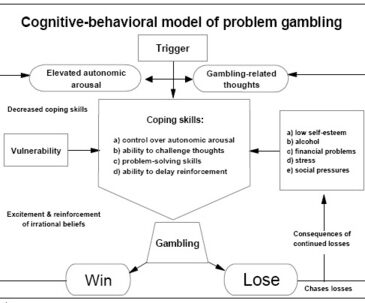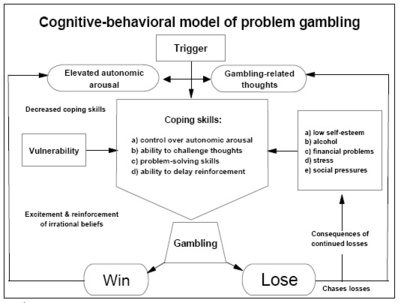Several models have been constructed to explain the nature of problem gambling. Sharpe & Tarrier* recently proposed a comprehensive model to explain the development and maintenance of problem gambling. This model can help clinicians treat problem gambling and can direct future research. The model considers the relationships among the physiological, cognitive, and behavioral factors that contribute to the development and maintenance of gambling behavior. Physiologically, gambling increases autonomic arousal (e.g., heart rate, electrodermal activity), which is experienced by the gambler as excitement. This excitement, in combination with monetary awards (only on a win), encourage individuals to continue to gamble. Over time, the gambling environment becomes associated with this state of excitement. Gambling-related thoughts (e.g., “this is my lucky day”, “today I lost, but tomorrow I’ll make up for it”) develop which then act as triggers to encourage further episodes of gambling. A gambler who loses has learned to expect some losses. The gambling-related thoughts are focused on believing that a win is sure to be around the corner, a belief that can lead to chasing losses. Sharpe & Tarrier believe that “the difference between those who control gambling and those who lose control lies in their different coping skills.” That is, an individual with poor coping skills is more vulnerable to problem gambling behavior. This vulnerability may be either enivonmental (e.g., failure to learn coping skills) or biological or both. In addition, certain situations (e.g., stress, substance abuse) may prevent an individual from utilizing existing coping skills, which increases the likelihood of gambling. Using this model, a clinician can create a treatment plan that can help a problem gambler focus on gambling-related behavior and thoughts, decrease autonomic arousal and increase coping skills.
Source: Adapted from *Sharpe, L., & Tarrier, N. (1993). Towards a cognitive-behavioural theory of problem gambling. British Journal of Psychiatry, 162, 407-412.
This public education project is funded, in part, by The Andrews Foundation.





